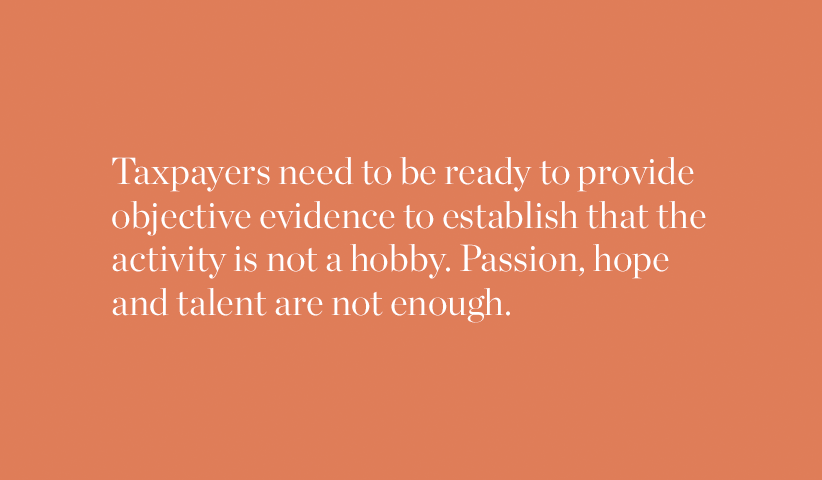
Advocate Daily originally published, “Passion, talent not enough to prove business activities”, in July 2015.
A recent Tax Court of Canada decision that questioned whether a hockey blog is a business or a hobby should remind entrepreneurs of the importance of understanding their business and its underlying data, says Toronto tax litigation lawyer Peter Aprile.
Berger v. The Queen, 2015 TCC 153 (CanLII) centred around former sports radio reporter Howard Berger and his Bergerbytes.ca blog, which he started in 2011 after being laid off. As court documents note, Berger wrote about the Toronto Maple Leafs, with the aim of producing “a quality hockey blog that would attract sufficient readership that sponsors would want to advertise on his site.” However, after attracting only one sponsor, Berger claimed business losses for the 2011 and 2012 tax years, which were subsequently denied “on the basis that Mr. Berger did not conduct any business activities.”
In his decision, however, Justice Campbell Miller found that, although Berger failed to provide “any projections, comparisons, readership numbers” for the blog, the venture is in an early stage and “the activity does go beyond hobby.”
“I conclude Mr. Berger had a predominant intention to make a profit, and in the first 18 months behaved in a reasonable businesslike manner to pursue that end.” The court referred the matter back to the Minister of National Revenue for reassessment and reconsideration.
“Justice Campbell Miller's decision in Berger v. The Queen was well-reasoned and the correct result. I argued an appeal with some similarities, Kaegi v. The Queen, 2008 TCC 566 (CanLII) some time ago. I have fond memories of that case, and I appreciated Justice Campbell Miller's decision in that case too," says Aprile, principal of Counter Tax Lawyers.
As Aprile explains, when deciding whether a new venture is a business or a hobby, the Canada Revenue Agency (CRA) considers criteria such as the profit and loss experience in past years, the taxpayer’s training and intended course of action, the capability of the venture to show a profit, as well as any other factors applicable to the activity.
For taxpayers carrying on a business with a personal element, the decision in Berger serves as a reminder of the need to ensure that the activity is carried on in a businesslike manner, Aprile explains, and reveals a number of interesting points worth bearing in mind.
“First, the government will challenge the deductibility of losses if the activity has a personal element. Taxpayers need to be ready to provide objective evidence to establish that the activity is not a hobby. Passion, hope and talent are not enough. A reasonable business plan designed to generate a profit along with evidence of ‘business hustle’ is a good place to start,” says Aprile.

It is also important that taxpayers understand their business and put themselves in a position to speak to the underlying data.
“In particular, taxpayers facing a CRA challenge or reassessment need to be knowledgeable and well prepared. In Berger, Justice Campbell Miller's findings of fact that Berger did not know the readership data, take any direct action to increase readership, or approach sponsors was surprising, and could have been fatal to the appeal,” he adds.
Activities that have a personal element are, in most situations, unique and creative, says Aprile, and in these cases, taxpayers need to work hard to find and establish their own badges of trade.
“It is clear that most inventors, painters, and writers, et cetera, will follow a non-traditional path to profit and an extended timeline. I believe that explaining the activity, and the unique commercial factors, are necessary to persuade a decision-maker that the badges of commerciality outweigh any personal elements,” he says.
And ultimately, says Aprile, Justice Campbell Miller's decision to exercise “immense internal restraint to not comment on the ongoing Leafs ‘legacy’ proves that "he is a better man than me.”
“I do not believe that a right-minded person could invest time blogging about that organizational failure without the prospect of some financial reward.”













.png?width=400&height=400&name=CT-How_Can_We_Help-22_july_NewGraphic_b(small).png)
.png?width=1386&height=1224&name=2025%20Legal500%20Elite%20Boutique%20Award%20(Badge).png)
.png?width=1386&height=1224&name=ITR%20Finalist%20Practice%20Leader%20of%20Year%20Peter%20Aprile%202024%20(Badge).png)

.png?width=1386&height=1224&name=2025%20Legal500%20Leading%20Firm%20Client%20Satisfaction%20Award%20(Badge).png)



.png?width=1386&height=1224&name=ITR%20Tax%20Innovator%20Finalist%202024%20Award%20(Badge).png)




